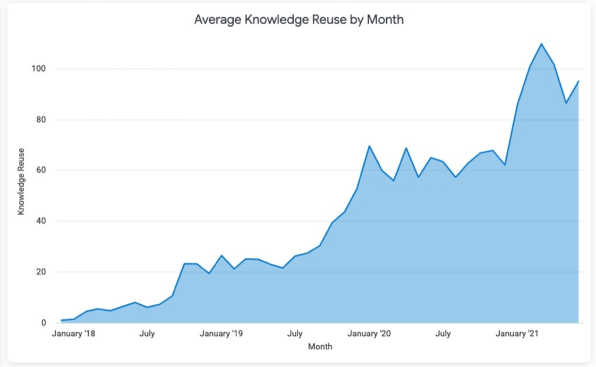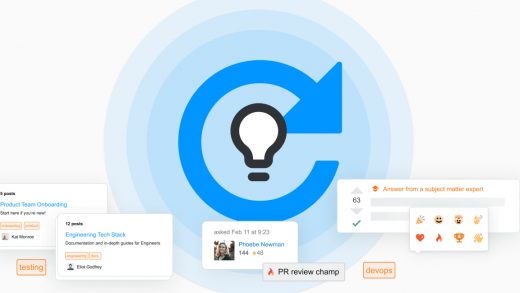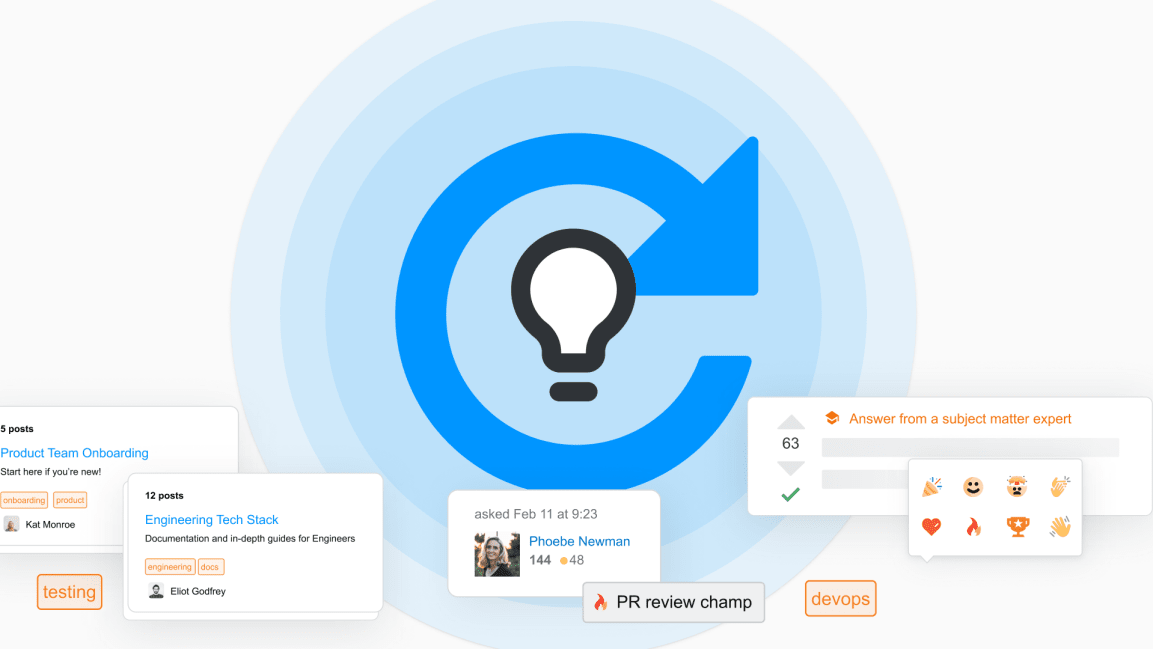What every business leader should know about “knowledge reuse”
“As soon as we started to see the power of having a library written out for one team within the organization, it became clear that there was value in leveraging the platform across more teams,” says Lauren Reid, a leader on the Success team at Expensify.
The company put all of its core policies in Stack Overflow for Teams, and it became the “mainstay place for people to ask questions,” Reid says. This made it easy for Expensify’s roughly 135 employees located all over the world—from Barbados to London to Melbourne—to gain equal access to company expertise, through a process known as “knowledge reuse.”
“Knowledge reuse, quite plainly put, is reusing the knowledge that…others have already learned, created, or proved,” says Vasudha Swaminathan, director of product for Teams, at Stack Overflow. “Why go about reinventing the wheel?”
When companies take advantage of knowledge reuse—a collaborative process in which ideas are shared, quickly accessed, improved upon, and then put back into the system—there’s no need to waste time reinventing anything. Rather, team members have ready access to critical information that they’ll need again and again, allowing them to remain what Swaminathan describes as “in the flow”—and thereby increasing productivity and innovation at work.
LESS INTERRUPTION, MORE INNOVATION
In Stack Overflow’s 2020 developer survey, many respondents noted coming across purple links when looking for coding solutions online. In other words, many had repeatedly asked the same questions and were led to the same answers on Google.
“The need to capture information and access it again and again is commonplace,” says Joy Liuzzo, senior director of product marketing at Stack Overflow. As one person put it, “There are a lot of things that I once knew, but no longer know, and it’s nice when that past knowledge is documented somewhere.”
It’s not just nice—it’s a huge time saver. At Expensify, a core philosophy is #WriteItDown. “That immediately creates a really equitable framework for all employees to work from, irrespective of what time zone they’re in,” Reid says. That means employees don’t have to wait for a particular subject-matter expert (SME) on the other side of the globe to wake up so they can ask a question—that person has already written the answer down in Stack Overflow for Teams.
Expensify’s knowledge reuse has increased significantly since employees began the practice in 2018. Workers reused knowledge at the company about 20 times a day shortly after adoption, and so far in 2021, they’ve been averaging 97 instances of knowledge reuse daily.

Financial software company Intuit’s roughly 5,000 engineers visit Stack Overflow to look for answers to their questions 120 times a day on average. “That’s 120 times a day that they’re not interrupting a colleague,” Liuzzo says.
THE IMPORTANCE OF INFORMATION CONTINUITY
Using Stack Overflow for Teams doesn’t just mean having equal access to current employees’ knowledge—it also keeps former employees’ expertise with the company even after they leave.
When SMEs depart, Swaminathan says, it’s easy to “get frantic about knowledge transfer and continuity.” But employee turnover—a recent report estimates that 52% of the U.S. workforce will seek new jobs this year—doesn’t present the same setbacks to companies when all their experts’ prior knowledge is recorded in a centralized, handy location.
New employees can also build off of past employees’ work in Stack Overflow. The platform lays bare how colleagues develop knowledge over time, meaning past employees’ work isn’t static, but continues to evolve with the company.
Recording company policies and best practices in a centralized location also simplifies the onboarding process for new hires and helps to align them with the company’s mission and methods. “For new employees, it can be overwhelming trying to run [a project] and keep within the [company’s] framework,” Reid says. Using Stack Overflow as a “central reference” lets new employees know they’re on the right track even if they’re performing a task that’s completely novel for them. At Expensify, Stack Overflow for Teams also serves as a repository for workplace-policy information, on everything from parental leave to what to do if your laptop breaks.
MORE AGILE TEAMS
For Swaminathan, a big part of knowledge reuse is not only about “bridging the gap” between team members, but different teams as well. At Stack Overflow, for example, the sales team uses the product internally to share their materials before a new product launch. Because this takes place transparently in Stack Overflow for Teams, those on the product side get insight into the questions and comments the sales team has about their work, informing how they may approach product development to better address those questions going forward.
At Expensify, this makes for more agile teams, ones where, as Reid puts it, “anyone can step into any [role] at any point.” Employees don’t have to confine themselves to a specific area of expertise, assigned when they first join the company. Rather, they can continue to learn from peers in different departments through the information they all share in Stack Overflow for Teams. It lets workers develop their careers while remaining at the same company—and prevents boredom.
“Employees can just look internally for other opportunities,” Reid says. “The access to that knowledge—and the ability to ask questions and have that written down centrally—is all one big interconnected loop for us.”
(37)



